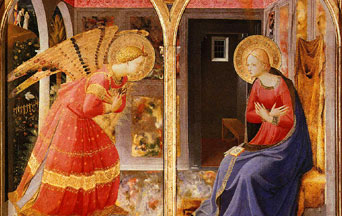
From our recent post, our readers learned in detail about a sacrilegious musical that was staged during the 2019 Panama World Youth Day. It was a parody of the Annunciation of the Angel and the Incarnation of the Word of God in the most pure bosom of the Blessed Mother. The whole thing was staged before Pope Francis, who at the end smiled and signaled his approval.
In reparation for this very serious offense to Our Lady, and in honor of the most Blessed Virgin Mary, Mother of God, we offer our readers some considerations by Prof. Plinio Corrêa de Oliveira on the feast of the Annunciation. This magnificent description of the greatness of the Annunciation contains elements to compare and understand the abomination that was staged before Pope Francis in Panama.
⚜ ⚜ ⚜
A person can have a very pleasant presence, timber of voice or physiognomic expressions, and can say very interesting and colorful things. All these are gifts that Divine Providence can give someone, who can use them to do a great good or a great evil.
However, there is another gift, more attractive than all these: the timbre of voice can be a resonance of the soul, and talking to a person one can feel his soul. The reverse may also be the case, and while the tone of voice is pleasant, it does not allow us to feel his soul. There are singers who have a very pleasant voice and sing with a lot of correction but you do not feel their soul when they sing. And the upshot is that while the audience has a pleasant impression from a merely sonorous point of view, it does not vibrate with the singers because they failed to communicate their souls.
The same can be said of a speaker. He may have a splendid voice, but if his soul dwells in a marshy background distant from his personality, he will not draw a good response. One deals with him, listens to him but has the impression he is not interesting because there is no human contact nor true human communication.
Communication of Soul, a Precious Gift
There are people who do not have a great voice, a big presence, but their soul somehow communicates, has verve, grace, interest. Their wrath makes others tremble, their sympathy moves others. When they take an interest in what another person says, others are also led to take an interest even if they say uninteresting things; because the way they talk about a subject already arouses interest. They are people whose soul is more expressive and communicates what others feel.
Nothing speaks more about a person’s soul than his gaze. You can have beautiful eyes but that does not mean that you have a beautiful gaze. And you can have a beautiful gaze even if your eyes are ugly because the beauty of soul is communicated through the way you look. One can have very beautiful eyes, but if the soul is far away, there is no real beauty in the communication.
Communication of soul is one of the most precious gifts a person can have. People who are entirely glacial and expressionless are lamentable.
Contact in Human and Angelic Conviviality
If it is true that the greatest attraction a person can have is his soul, contact between pure spirits—the angels—must be much more interesting than contact between men. True, our face reveals the soul, but to a certain extent, it can also veil it, as the face has the capacity to reveal or veil one’s personality. In human conviviality, the most interesting aspect would be the communication between souls who get to know each other, sense each other and enter into harmony, mutual understanding and sympathy.
This would be even more so among angels, spirits that communicate with one another with all their purity, clarity, greatness, majesty and strength. The angels have such a strong presential action that many saints or mystics who had visions of angels stayed two or three days out of normal life. An angel is a masterpiece of God, and one who is in a position to see an angel will have a sanctifying and intense joy.
The Salutation of the Archangel Gabriel to the Queen of Angels
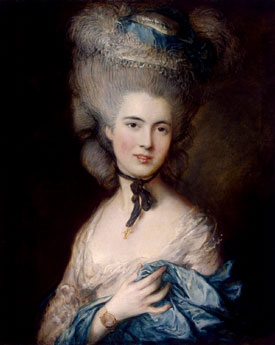 The “Lady in Blue” painting by Thomas Gainsborough (1727–1788), depicts a middle-aged Englishwoman with a rather feline face, dressed in blue. A woman with such personality that I was truly delighted seeing the painting. The impressions she gave me would deserve an article titled “Talking to the Lady in Blue.”
The “Lady in Blue” painting by Thomas Gainsborough (1727–1788), depicts a middle-aged Englishwoman with a rather feline face, dressed in blue. A woman with such personality that I was truly delighted seeing the painting. The impressions she gave me would deserve an article titled “Talking to the Lady in Blue.”
Imagine a picture of an angel, even better, that of an archangel: the Archangel Saint Gabriel appearing to Our Lady, for example. We can imagine the encounter: the Archangel is God’s messenger, who carries God’s highest, most splendid and best messages. Therefore, he has a splendid way of communicating what God wants to say, resonating the divine word.
In this picture, imagine Our Lady in her house in Nazareth as the Archangel Gabriel, one of the highest spirits in Heaven, always in the presence of God, appears to her. The Archangel gives the Blessed Virgin a profound greeting full of charm, nobility, elegance and distinction. A majesty unimaginable because he is pure spirit and she is only a human creature. Yet he bows in a sign of unspeakable respect, for she is his Queen, Queen of the angels. Then he pays to her the most beautiful homage that was ever rendered on Earth. She receives that homage and becomes enthused because she perceives God through the angel.
The Contact of Soul in the Annunciation to Our Lady
If a soul-to-soul contact among men is the cause of so much joy in spite of our poor grimy souls degraded by our nature conceived in Original Sin, what was the joy in Our Lady’s soul-to-soul contact with the Archangel? What was the angel’s gaze like while contemplating the one who, although inferior to him as a mere human creature, is incomparably higher than him?
In an anthropomorphic way, it could be said that the Archangel transposed all spaces from God to the little town of Judea to meet Our Lady in person. It is from this perspective that the Gospel narrative dedicated to the Annunciation must be imagined: “The angel Gabriel was sent from God into a city of Galilee, called Nazareth, to a virgin espoused to a man whose name was Joseph, of the house of David; and the virgin’s name was Mary. And the angel being come in, said unto her: Hail, full of grace, the Lord is with thee: blessed art thou among women” (Luke 1:26-28).
The Immaculate Conception: The Celebration of Privilege
The simplicity of this Gospel narration has something grand precisely as it relates to this soul-to-soul contact. When you hear it, you almost feel the Holy Spirit. It is a simple narration, but of really splendorous things!
The angel chose the courtyard of the Blessed Virgin’s house, where she was, to enter as a king. In the period before the French Revolution, especially after the coronation, kings made solemn entry into cities. Thousands of people participated with great gala. But this is nothing compared to the entrance of the angel! The angel’s words sound like a single song the likes of which no one ever sung or will sing. One can imagine that while Saint Gabriel saluted Our Lady, the place was filled with angels, all singing and rejoicing, though heard by no one.
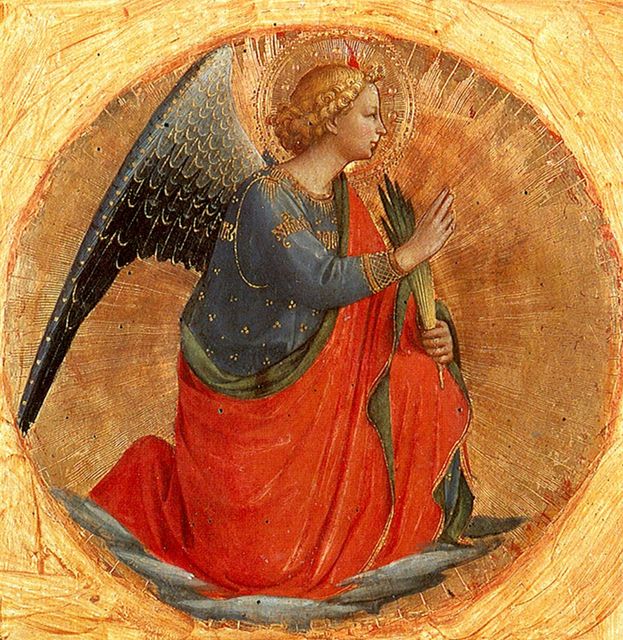 Upon entering, the angel said, “Hail, full of grace, the Lord is with thee: blessed art thou among women.” Every word was uttered solemnly: when he pronounced the name of God, he manifested all his love to Him; when he addressed Our Lady, he showed her all reverence. In this contact, she shone splendidly with extreme tenderness and majesty, as if assumed by the angel.
Upon entering, the angel said, “Hail, full of grace, the Lord is with thee: blessed art thou among women.” Every word was uttered solemnly: when he pronounced the name of God, he manifested all his love to Him; when he addressed Our Lady, he showed her all reverence. In this contact, she shone splendidly with extreme tenderness and majesty, as if assumed by the angel.
When the angel exclaims, “Hail, full of grace,” he makes the greatest compliment anyone could receive: Grace was all that existed in her, and thus God saluted her and the angel revered her. Gratia plena! Full of grace! Pronounced by the angel, the word “grace” acquires all the beauty and splendor of God’s grace. Gratia plena gives the idea of fullness; it corresponds to saying that in her there is nothing but grace. Moreover, all the graces created for men are contained in her, and from her would overflow to us. These are words of incomparable wealth and majesty.
Pope Francis’s “Sin of the Elite” and New, Egalitarian Mariology
The Gospel narrative continues, saying that Our Lady, having heard what the angel said: She “was troubled at his saying, and thought with herself what manner of salutation this should be. And the angel said to her: Fear not, Mary, for thou hast found grace with God” (Luke 1:29-30).
She wondered what the revelation meant and paid attention to the words to understand what God was saying. She reasoned calmly, without losing her psychological distance or panicking, but unable to understand them, she was perplexed. At that point, the angel said, “Fear not, Mary, for thou hast found grace with God.” She undoubtedly she felt small facing the angel. So in order to make her at ease, he said what it meant: “Thou art greater than I.”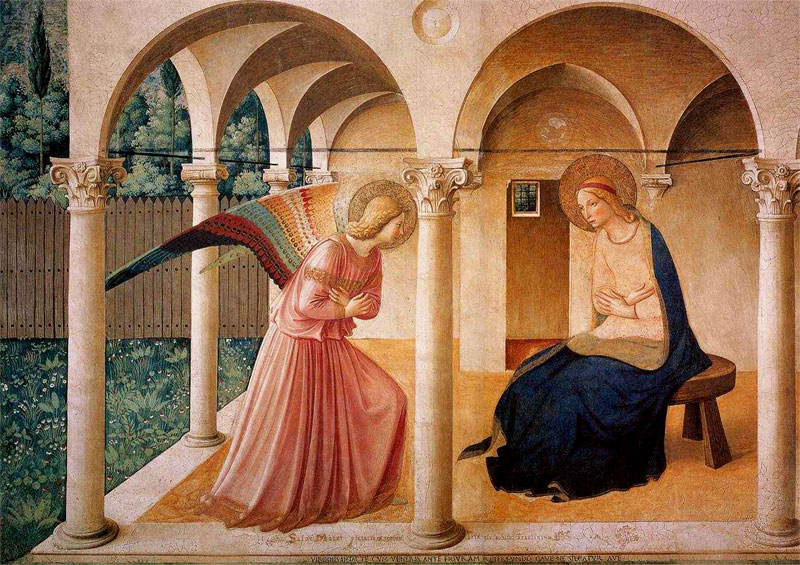
The Blessed Virgin Conceived of the Holy Spirit
“Behold thou shalt conceive in thy womb, and shalt bring forth a son; and thou shalt call his name Jesus. He shall be great, and shall be called the Son of the most High; and the Lord God shall give unto him the throne of David his father; and he shall reign in the house of Jacob for ever. And of his kingdom there shall be no end. And Mary said to the angel: How shall this be done, because I know not man? And the angel answering, said to her: The Holy Ghost shall come upon thee, and the power of the most High shall overshadow thee. And therefore also the Holy which shall be born of thee shall be called the Son of God. And behold thy cousin Elizabeth, she also hath conceived a son in her old age; and this is the sixth month with her that is called barren: Because no word shall be impossible with God. And Mary said: Behold the handmaid of the Lord; be it done to me according to thy word. And the angel departed from her” (Luke 1:31-38).
One can imagine the majesty of this proclamation. First when the angel pronounces the name of Jesus, then when He says that “He shall be great, and shall be called the Son of the most High.” All this is so grand, that it is superior to any cogitation.
Science Confirms: Angels Took the House of Our Lady of Nazareth to Loreto
“And the Lord God shall give unto him the throne of David his father.” That is to say, although the dynasty had fallen, Saint Joseph the carpenter belonged to the house of King David. And the son of Mary Most Holy will have the throne of David. She was well aware that this throne was a symbol of our Lord’s spiritual kingship. “And he shall reign in the house of Jacob for ever. And of his kingdom there shall be no end.” All this was said by an angel, and she, the angels’ great connoisseur, appreciated the message.
“And Mary said to the angel: How shall this be done, because I know not man?” This is not an objection, but a question: how will it be done if I have a vow of virginity?
The Blessed Virgin said: “Behold the handmaid of the Lord; be it done to me according to thy word. And the angel departed from her.” At that moment she conceived by the work of the Holy Spirit, and the Word of God became Flesh. The God-Man began to live in her, fully lucid from the first moment of His being, and she began to worship Him.
The Blessed Virgin as “Architect” of the Child Jesus
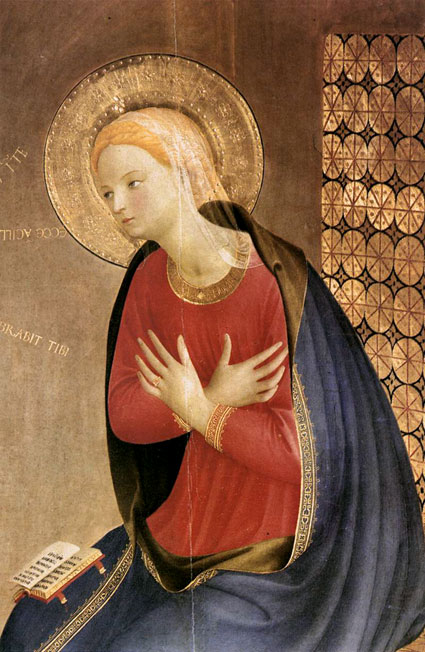 The point of these comments is to instill in us a taste for the beauty of the scene so we can better understand that sublime moment. In so doing, we will better worship God, Our Lord Jesus Christ, and better practice the cult of hyperdulia, venerating Our Lady. By better understanding this exalted scene, perceiving the soul-to-soul contact between Our Lady and the angel at the Annunciation, we will better understand her soul-to-soul contact with Our Lord in His mother’s womb. In so doing, “Hic taceat omnis lingua” (all tongues here fall silent), we proceed as the Archangel Gabriel by taking a distance before the mystery.
The point of these comments is to instill in us a taste for the beauty of the scene so we can better understand that sublime moment. In so doing, we will better worship God, Our Lord Jesus Christ, and better practice the cult of hyperdulia, venerating Our Lady. By better understanding this exalted scene, perceiving the soul-to-soul contact between Our Lady and the angel at the Annunciation, we will better understand her soul-to-soul contact with Our Lord in His mother’s womb. In so doing, “Hic taceat omnis lingua” (all tongues here fall silent), we proceed as the Archangel Gabriel by taking a distance before the mystery.
Conceived without Original Sin, Our Lady knew everything that was happening in her. In the most mysterious and very complex phenomenon of begetting, whenever her body provided elements to form the Most Sacred Body of Our Lord Jesus Christ, she so willed it.
Besides the physiological aspect, her giving each element to form His Body had also a symbolic aspect. For example, giving her maternal contribution to form the divine eyes of the Child, for example, the Holy Mother of God foresaw all the good that the divine gaze of her Son would do until the end of time: the gaze that later converted Saint Peter; the look of censure to Judas; last gaze He gave her from atop the Cross. Every gaze is poor compared to this gaze.
Our Lady’s conviviality with the human soul of her Son, hypostatically united to the Holy Trinity, is something so sublime that it is unimaginable.
The preceding article is adapted from a lecture Prof. Plinio Corrêa de Oliveira gave on March 23, 1979. It has been translated and edited for publication without his revision. –Ed.
